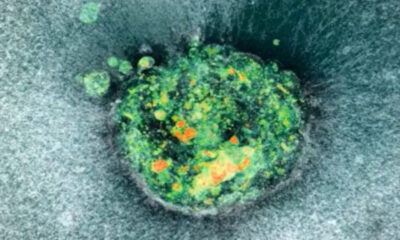Science
Johns Hopkins Engineers Quantum Sensors for Early Disease Detection

Engineers at Johns Hopkins University have developed an innovative class of quantum sensors capable of detecting extremely faint molecular vibrations. This breakthrough, led by Ishan Barman, could significantly enhance early disease diagnosis, as well as improve industrial monitoring and environmental surveillance. The findings were published in the scientific journal Science Advances on August 26, 2025.
The advanced quantum sensors utilize a new approach to detect molecular vibrations, which can provide chemical “fingerprints” indicative of various diseases. By identifying these unique movements of atoms within molecules, the sensors could lead to faster and more accurate detection of disease biomarkers found in blood, saliva, or urine. This capability is particularly crucial for diagnosing conditions ranging from infections to metabolic disorders and cancer.
Enhancing Detection Methods
Traditional techniques, such as infrared or Raman spectroscopy, face challenges due to the faintness of signals that are often lost in background noise. Barman, who holds positions at the Sidney Kimmel Comprehensive Cancer Center and the Department of Radiology and Radiological Science at the Johns Hopkins School of Medicine, emphasized the need for a more radical solution. “We were trying to overcome a long-standing challenge in molecular sensing: how do you make optical detection of molecules more sensitive, more robust, and more adaptable to real-world conditions?”
To achieve this, the research team employed highly reflective gold mirrors to create an optical cavity, which enhances the interaction between light and enclosed molecules. This technique leads to the formation of new quantum states known as “vibro-polaritons,” enabling the sensors to detect molecular vibrations effectively under ambient conditions without requiring extreme environments typically necessary for preserving fragile quantum states.
A Broader Impact on Science and Industry
The implications of this research extend beyond disease detection. In pharmaceutical manufacturing, quantum sensors could facilitate real-time monitoring of complex chemical reactions, ensuring product safety and consistency. In environmental science, they hold the potential for trace-level detection of pollutants or hazardous compounds with unprecedented reliability.
Lead author Peng Zheng, an associate research scientist in mechanical engineering at Johns Hopkins, noted that this study marks a significant transition from concept to practical application. “Rather than passively detecting molecules, we can now engineer the quantum environment around them to enhance their optical fingerprints,” Zheng explained.
This advancement represents a crucial step forward in the field of quantum sensing, with future applications likely to include compact, microchip-scale devices. Barman envisions a future where these technological advancements are integrated into portable, point-of-care tools and artificial intelligence-powered diagnostic systems.
The research highlights the transformative potential of quantum sensing technologies in the medical field, biomanufacturing, and environmental protection. “The future of quantum sensing isn’t stuck in the lab — it’s poised to make a real-world impact,” Barman concluded.
-

 Entertainment3 months ago
Entertainment3 months agoAnn Ming Reflects on ITV’s ‘I Fought the Law’ Drama
-

 Entertainment4 months ago
Entertainment4 months agoKate Garraway Sells £2 Million Home Amid Financial Struggles
-

 Health3 months ago
Health3 months agoKatie Price Faces New Health Concerns After Cancer Symptoms Resurface
-

 Entertainment3 months ago
Entertainment3 months agoCoronation Street’s Carl Webster Faces Trouble with New Affairs
-

 Entertainment3 months ago
Entertainment3 months agoWhere is Tinder Swindler Simon Leviev? Latest Updates Revealed
-

 Entertainment4 months ago
Entertainment4 months agoMarkiplier Addresses AI Controversy During Livestream Response
-

 Science1 month ago
Science1 month agoBrian Cox Addresses Claims of Alien Probe in 3I/ATLAS Discovery
-

 Entertainment4 months ago
Entertainment4 months agoKim Cattrall Posts Cryptic Message After HBO’s Sequel Cancellation
-

 Entertainment2 months ago
Entertainment2 months agoOlivia Attwood Opens Up About Fallout with Former Best Friend
-

 Entertainment3 months ago
Entertainment3 months agoMasterChef Faces Turmoil as Tom Kerridge Withdraws from Hosting Role
-

 Entertainment4 months ago
Entertainment4 months agoSpeculation Surrounds Home and Away as Cast Departures Mount
-

 World2 months ago
World2 months agoCole Palmer’s Mysterious Message to Kobbie Mainoo Sparks Speculation





















